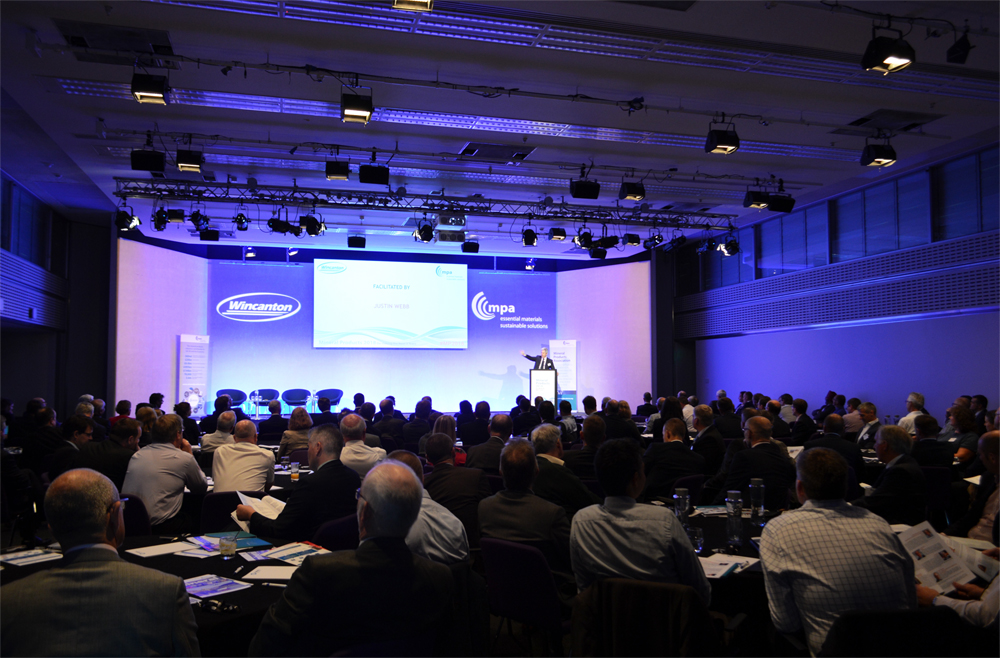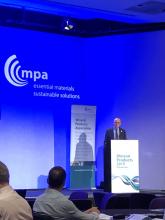
The UK’s
However, provided planned infrastructure spending and housing growth materialises in 2019, there should see an upswing in demand.
This was the view of Martin Riley, MPA chairman and senior vice president from
The event, hosted by BBC Radio 4 Today programme presenter Justin Webb and themed Improving Productivity… Embracing New Technologies, attracted a packed audience of 200 high-level delegates from over 106 companies and valued stakeholders.
Riley expressed concern about the proposed changes to the National Planning Policy Framework (NPPF), which could further weaken an already compromised mineral planning system, while increasing constraints on the access to essential mineral resources.
The recently announced review of protected designations, such as National Parks and AONBs (Areas of Outstanding Natural Beauty), may further constrain the industry’s ability to supply future demand.
He restated the MPA’s commitment to achieving Zero Harm after setbacks in health and safety in 2017 which have galvanised a resetting of the industry agenda.
The Rt Hon Sir Stephen O’Brien, former United Nations Under-Secretary-General for Humanitarian Affairs and Emergency Relief Coordinator, gave the keynote speech focussing on leadership, political risk and ending conflict, saying that “you can't control the beta risk, the risks beyond your control, the political risks.”
Sir Stephen acknowledged the strategic and essential role the mineral products industry plays in the economy and our way of life and the need for greater recognition by policymakers.
Sir Stephen, Professor Vernon Bogdanor from Kings College London and Anna leach, head of economic intelligence at the Confederation of British Industry (CBI) discussed the political and economic outlook over the coming years and the continuing uncertainties posed by Brexit and other world developments.
Rebecca Riley from National Institute of Economic and Social Research/The Economic Statistics Centre of Excellence; Andrew Sentance of Price Waterhouse Coopers, and Daniel Thornton from the Institute for Government gave their insights into productivity and the reasons behind the productivity gap.
Professor Michael Wooldridge from the University of Oxford and Jackson Bond of IT company relayr considered the future of automation.
Michael Wooldridge highlighted the skills and production methods that could benefit from Artificial Intelligence.
Jackson Bond said: "You don't know what you don't know: you don't know how much data is hidden in your machinery that could improve your productivity.”
Philip Moon of DAF Trucks joined them for a panel debate on automation and transport.
There was consensus on the potential for a growing trend towards autonomous transport over time as the technology improves.
Professor Alistair Gibb from the School of Architecture, Building and Civil Engineering at Loughborough University and Oliver Novakovic of Barratt Homes discussed Offsite construction.
Professor Alistair Gibb highlighted that Offsite is nothing new and has been happening for 2,000 years.
There were clear market opportunities but it needs to be kept in perspective.
"Offsite could triple and still be a relatively small part of the construction industry," he said.
Oliver Novakovic said that the definition of Offsite included a whole scope of activities and its development would vary from sector to sector.
Commenting, Nigel Jackson, chief executive of the MPA, said: “This important conference brings the industry and many of its key stakeholders once a year to look at the big picture economically, politically and to address key current issues.
“We were once again fortunate to have such a high calibre line up of speakers and panellists to provoke and stimulate discussion.”







